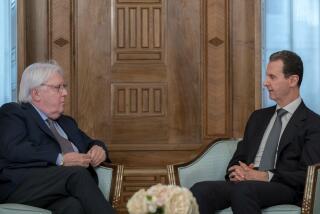Syria Allows Jewish Citizens to Travel--Except to Israel : Mideast: Peace talks are upbeat as Jerusalem responds by proposing ‘pilot’ Palestinian elections.
WASHINGTON — Syria lifted travel and property-transfer restrictions from its Jewish population Monday--a move Israel and the United States have sought for years--as Middle East peace talks resumed in an upbeat atmosphere that contrasted sharply with the stalemate of earlier rounds.
The Israeli delegation, which welcomed the move, proposed municipal elections in the cities of the West Bank and Gaza Strip, a plan that it said could serve as a “pilot” for more significant Palestinian elections.
The Palestinians replied, however, that the election of mayors and city council members should come after balloting for a self-governing authority, something Israel is not ready to permit.
Although no one was predicting a breakthrough and mutual distrust remained palpable as the talks resumed, most delegations expressed hope that progress would be made before this session ends Thursday. The talks are scheduled to resume in Rome in a few weeks.
“We are going to do our utmost to engage on these issues and achieve genuine progress,” said Hanan Ashrawi, spokeswoman for the Palestinian delegation.
Israeli Deputy Foreign Minister Benjamin Netanyahu suggested at a press conference that reporters, remembering earlier deadlocks, may not be “aware of the fact that we are making progress. We have come to make progress.”
Only Bushra Kanafani, spokeswoman for the Syrian delegation, had a more downbeat assessment. “The Israeli delegation started with . . . the same irrelevant issues (and) the same allegations that we have heard in previous meetings and in previous rounds. I cannot report to you any progress,” she said.
Earlier, Kanafani said Damascus has decreed that travel in Syria is “open for everyone, including the Jews, without any restrictions.” She added, however, that Syrians, regardless of religion, are prohibited from visiting Israel or from emigrating. The Israelis would like Damascus to allow its estimated 4,500 Jews to emigrate to Israel or elsewhere.
State Department spokeswoman Margaret Tutwiler, who first revealed the action, said the United States is “pleased” with the “lifting of discriminatory restrictions on travel and disposition of property for the Syrian Jewish community.”
Elyakim Rubinstein, Cabinet secretary in Israeli Prime Minister Yitzhak Shamir’s government, said the Syrian decision “can only bring joy to every free person, to every Jew, everywhere. . . . It makes you feel better.”
Still, all sides remained far apart in the separate face-to-face talks between Israel and each of its neighbors--Syria, Lebanon and Jordan and the Palestinians.
Netanyahu said that Israel’s proposal for Palestinian municipal elections is intended to “set the stage for further development in this area.”
But Ashrawi responded that Palestinians have been demanding municipal elections for more than a decade and called the Israeli proposal “a diversion.”
She said the Palestinians want to select a self-governing authority to administer all of the West Bank and Gaza before picking mayors and city council members. Israel has rejected that proposal.
Israel conducted municipal elections in the occupied territories in 1976. Candidates supporting the Palestine Liberation Organization swept the board. The Israeli authorities canceled elections scheduled for 1980 after concluding that the PLO would win again.
All of the mayors elected in 1976, with the exception of Elias Freij of Bethlehem, have been removed from office, and several have been deported for PLO activity.
In Jerusalem, Shamir decided to go ahead with the election plan after weighing the impact the proposal might have on Israel’s June general election campaign. He apparently concluded that the political benefits outweigh the political liabilities.
Times staff writer Daniel Williams in Jerusalem contributed to this report.
More to Read
Sign up for Essential California
The most important California stories and recommendations in your inbox every morning.
You may occasionally receive promotional content from the Los Angeles Times.










